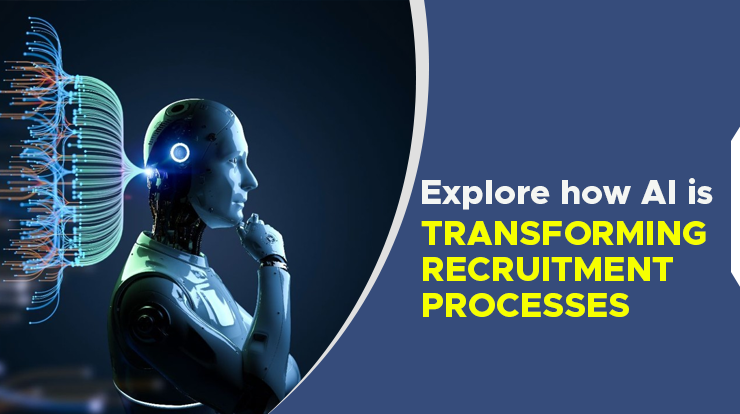In the fast-paced world of hiring, traditional recruitment often feels like navigating a maze filled with challenges. From sifting through endless resumes to scheduling interviews, the workload can quickly become overwhelming. However, the emergence of Artificial Intelligence (AI) is revolutionizing how organizations approach recruitment, transforming a cumbersome process into a streamlined experience. This transformation not only enhances efficiency but also ensures that companies find the best candidates for their needs. In this blog, we will explore the importance of Artificial Intelligence in recruitment, the benefits it brings, and how AI in recruitment aligns with the evolving landscape of human resources.
The Importance of Artificial Intelligence in Recruitment:
The role of AI in recruitment is becoming increasingly significant, especially as organizations strive to attract top talent amid fierce competition. Here are a few key reasons why AI is crucial in this domain:
- Efficiency in Talent Acquisition: AI tools can process and analyze vast amounts of data at lightning speed, drastically reducing the time taken to identify suitable candidates. This capability allows HR teams to focus on strategic decision-making rather than getting bogged down in administrative tasks.
- Enhanced Candidate Experience: AI-powered chatbots and virtual assistants can engage with candidates in real-time, providing instant responses to queries and guiding them through the application process. This leads to a more positive experience for job seekers, enhancing the employer’s brand reputation.
- Data-Driven Decisions: AI can analyze trends and patterns from historical hiring data, enabling recruiters to make informed decisions based on data rather than intuition. This reliance on analytics leads to better hiring outcomes and minimizes biases.
Benefits of AI in Recruitment:
The integration of AI into recruitment processes offers numerous benefits that can greatly enhance organizational effectiveness. Here are some of the key advantages:
1. Improved Candidate Screening:
AI can automate the initial screening of resumes, filtering out unqualified candidates based on predetermined criteria. This process ensures that only the most relevant applications reach the hiring manager’s desk, saving valuable time and resources.
- Automated Parsing: AI algorithms can parse resumes, extracting essential information like skills, experiences, and qualifications. This automated parsing helps create a shortlist of candidates quickly.
- Customizable Criteria: Recruiters can set specific criteria to align with the job requirements, enabling a tailored approach to candidate selection.
2. Bias Reduction:
AI algorithms can be designed to eliminate biases that often plague the recruitment process. By focusing on skills and qualifications rather than demographic factors, AI fosters a more inclusive hiring environment, promoting diversity within the workforce.
- Blind Recruitment: AI can anonymize resumes, removing identifying information that could lead to bias. This process encourages hiring based solely on skills and experiences.
- Bias Monitoring: Continuous monitoring of AI systems can help identify and mitigate any unintended biases that may emerge over time.
3. Predictive Analytics:
By leveraging predictive analytics, organizations can forecast hiring needs and identify potential future talent gaps. This foresight allows companies to proactively seek candidates who align with their long-term goals rather than merely reacting to immediate vacancies.
- Talent Pipeline Management: AI can analyze current employee performance and turnover rates, helping organizations understand their talent pipeline better.
- Strategic Workforce Planning: Predictive analytics can support strategic workforce planning, ensuring that organizations are always prepared for future challenges.
4. Enhanced Interviewing Process:
AI-powered tools can assist in scheduling interviews and even conducting initial assessments through automated video interviews. These platforms analyze candidates’ responses and body language, providing valuable insights into their suitability for the role.
- Automated Scheduling: AI tools can coordinate interview times between candidates and interviewers, reducing the back-and-forth communication often required.
- AI-Driven Assessments: AI can conduct preliminary assessments, analyzing candidates’ verbal and non-verbal cues to gauge their suitability for the role.
5. Continuous Improvement:
AI systems continuously learn from past hiring decisions, allowing them to refine their algorithms and improve future candidate recommendations. This iterative process helps organizations evolve their recruitment strategies over time.
- Feedback Loops: Organizations can create feedback loops where hiring managers provide input on the quality of candidates sourced by AI, leading to improved algorithms.
- Learning from Outcomes: AI can analyze the performance of hired candidates, adjusting its recommendations based on success rates.
AI in Recruitment: A Game Changer for Organizations
As the best university in Rajasthan, Sangam University recognizes the importance of adapting to technological advancements in all fields, including human resources. By integrating AI into recruitment processes, organizations can leverage innovative tools that simplify complex tasks and enhance overall effectiveness. This shift not only positions companies as leaders in their industry but also attracts top-tier talent eager to work for forward-thinking organizations.
The Role of Education in Adapting to AI in Recruitment:
In this rapidly changing landscape, education plays a crucial role in equipping future HR professionals with the skills needed to navigate the AI-driven recruitment environment. As a private university in Rajasthan, Sangam University offers a range of programs designed to prepare students for careers in human resources, ensuring they are well-versed in the latest technologies and trends.
- Curriculum Development: Courses that incorporate AI and data analytics into the recruitment curriculum empower students to understand and implement these technologies effectively. Students learn how to use AI tools to enhance their recruitment processes, making them invaluable assets to future employers.
- Hands-on Experience: Through internships and industry partnerships, students gain practical experience using AI tools, preparing them for successful careers in recruitment. These experiences provide real-world insights into how AI is transforming hiring practices.
- Networking Opportunities: Collaborations with industry leaders allow students to build connections that can lead to future job placements, enhancing their career prospects. Networking is vital in the recruitment industry, and Sangam University facilitates these connections to benefit its students.
Key Considerations for Implementing AI in Recruitment:
While the benefits of AI in recruitment are clear, organizations must approach implementation thoughtfully. Here are some considerations to keep in mind:
- Transparency and Ethics: Companies should ensure their AI systems are transparent and adhere to ethical guidelines to build trust with candidates. Establishing clear guidelines for how AI is used in recruitment helps foster trust.
- Training and Development: HR teams must be trained to work alongside AI tools, understanding how to interpret data and make informed decisions based on AI insights. Regular training sessions can help ensure that the HR team is well-equipped to utilize AI effectively.
- Continuous Evaluation: Regular assessments of AI tools and their impact on recruitment outcomes will help organizations identify areas for improvement and ensure they maximize the potential of these technologies. Implementing a feedback mechanism can help organizations fine-tune their AI systems over time.
The Future of AI in Recruitment:
As technology continues to advance, the future of AI in recruitment looks promising. Here are some trends that may shape the landscape in the coming years:
- Increased Personalization: AI will enable organizations to deliver more personalized candidate experiences, tailoring communication and interactions based on individual preferences and behaviors.
- Greater Focus on Employee Experience: AI tools will not only assist in hiring but will also contribute to enhancing the overall employee experience by helping organizations understand employee needs and preferences.
- Integration with Other Technologies: AI will likely integrate with other emerging technologies, such as virtual reality (VR) and augmented reality (AR), to create immersive and engaging recruitment experiences.
Conclusion:
The integration of AI into recruitment processes is not just a trend; it is a transformative movement that is reshaping how organizations attract and hire talent. By understanding the importance of Artificial Intelligence, organizations can harness its power to streamline operations, enhance decision-making, and create a more engaging candidate experience. As the top university in Rajasthan, Sangam University is dedicated to preparing the next generation of HR professionals to thrive in this evolving landscape, ensuring they are equipped with the skills and knowledge to leverage AI effectively.
For more information on how Sangam University is leading the charge in education and innovation, visit our website today!
Frequently Asked Questions:
What are the key benefits of using AI in recruitment?
Ans. AI improves efficiency, reduces bias, enhances the candidate experience, and provides data-driven insights.
How can AI help in reducing biases during recruitment?
Ans. AI can focus on skills and qualifications rather than demographic factors, fostering a more inclusive hiring process.
What role does education play in adapting to AI in recruitment?
Ans. Educational institutions, like Sangam University, prepare students by integrating AI into their curriculum and providing hands-on experience.
Is AI a trend or a long-term solution in recruitment?
Ans. AI is a transformative movement that is reshaping recruitment processes and is expected to be a long-term solution.
How can organizations ensure the ethical use of AI in recruitment?
Ans. Companies should prioritize transparency, adhere to ethical guidelines, and regularly evaluate their AI systems for bias and effectiveness.


